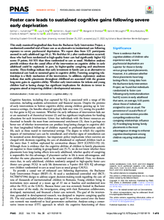Significance
There is evidence that the cognitive abilities of children who experience early, severe psychosocial deprivation are superior for those in family- versus group-based placements. However, it is unknown whether these placements have long-lasting effects. Using data from the Bucharest Early Intervention Project, we found that individuals randomized to foster care following early institutionalization had IQ scores in early adulthood that were, on average, 9.00 points above those of individuals assigned to care as usual. The persistence of causal effects of foster care intervention provides compelling evidence that caregiving relationships influence IQ. Providing long-lasting family placements is the most advantageous strategy to enhance cognitive development among children requiring institutional care.
Abstract
This study examined longitudinal data from the Bucharest Early Intervention Project, a randomized controlled trial of foster care as an alternative to institutional care following exposure to severe psychosocial deprivation. The authors report data from 135 participants assessed in early adulthood (age 18 y). They found that 16 y after randomization occurred, those who had been randomized to high-quality foster care had significantly higher IQ scores (9 points, 0.6 SD) than those randomized to care as usual. Mediation analyses provide evidence that the causal effect of the intervention on cognitive ability in early adulthood could be explained, in part, by higher-quality caregiving and attachment security. These findings indicate that early investment in family care as an alternative to institutional care leads to sustained gains in cognitive ability. Fostering caregiving relationships is a likely mechanism of the intervention. In addition, exploratory analyses indicate that stable placements throughout childhood are associated with the greatest long-term gains in cognitive ability. Whether early interventions for infants and young children lead to lasting change has significant implications for decisions to invest in programs aimed at improving children’s developmental outcomes.

